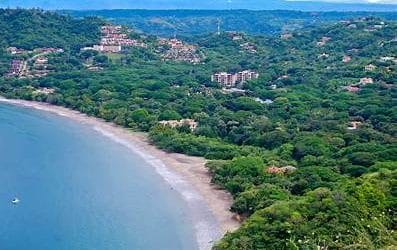Costa Rica is far more than a postcard paradise. Behind the palm-lined beaches and emerald rainforests lies one of Latin America’s most promising environments for building and scaling a business. With its prime geographic position, political stability, skilled workforce, forward-thinking infrastructure, and national commitment to sustainability, Costa Rica offers a fertile landscape where commerce and nature work in tandem. Here, even native flowering plants — such as the Flor de Itabo — support rare Melipona bees, highlighting the country’s ability to harmonise economic progress with ecological stewardship.

Why is Costa Rica’s location a strategic advantage?
Costa Rica’s position in Central America gives businesses direct access to both North and South American markets.
Flanked by the Pacific Ocean and the Caribbean Sea, with modern port infrastructure on each coast and close proximity to the Panama Canal, it’s a natural logistics hub that facilitates rapid trade.
Key location advantages include:
- Immediate access to major markets – Products can be shipped to the US in as little as 48 hours, reducing lead times and inventory costs.
- Dual-coast shipping routes – Companies can diversify export strategies by serving Atlantic and Pacific destinations without additional overland transport.
- Business-friendly time zones – Central Standard Time aligns closely with US working hours and offers manageable overlaps with Europe, enabling real-time communication.
How stable is Costa Rica’s political environment?
Costa Rica’s long-standing democracy offers an unmatched level of predictability in Latin America.
Since abolishing its army in 1949, the country has directed national resources toward education, healthcare, and infrastructure — conditions that foster business confidence.
Political stability benefits include:
- Minimal political risk – Investors can operate with lower exposure to sudden policy shifts or unrest common in the region.
- Consistent rule of law – Transparent legal processes protect contracts, property rights, and intellectual property.
- Global reputation for reliability – International indices consistently rank Costa Rica high for governance, making it attractive for multinational operations.
What is the quality of Costa Rica’s workforce?
Costa Rica offers a talent pool that is both highly educated and bilingual.
With a literacy rate exceeding 97% and a strong focus on STEM education, the country produces professionals capable of meeting the demands of advanced industries.
Workforce strengths:
- Strong English proficiency – Ideal for service exports, BPOs, and tech sectors that require seamless cross-border communication.
- Growing pool of STEM graduates – Supports innovation-driven sectors such as biotechnology, medical devices, and software engineering.
- Resilient work ethic – The cultural value of “Pura Vida” translates to dedicated, adaptable employees who prioritise quality and long-term results.
How developed is Costa Rica’s infrastructure?
Costa Rica’s infrastructure supports modern business operations while steadily improving.
Urban and free-trade zone areas benefit from reliable connectivity and logistics capabilities that meet international standards.
Infrastructure highlights:
- Purpose-built industrial parks – Equipped with utilities, security, and connectivity tailored to export-oriented manufacturing and service companies.
- International transport links – San José’s Juan Santamaría International Airport and Liberia’s Daniel Oduber Quirós International Airport offer frequent global connections for executives and cargo.
- Renewable-powered energy grid – Over 98% of the country’s electricity is generated from renewable sources, reducing environmental impact for operations.
Why is sustainability central to Costa Rica’s business appeal?
Costa Rica’s global reputation as a sustainability leader adds marketing value and long-term viability for investors.
Its commitment to becoming carbon-neutral attracts eco-conscious brands and customers.
Sustainability incentives:
- Brand credibility – Products and services based in Costa Rica can leverage the country’s eco-friendly image for stronger international appeal.
- Green investment incentives – Government policies reward companies that implement renewable energy or eco-efficient practices.
- National environmental culture – Sustainability is woven into daily life, ensuring employee and community support for responsible operations.
Which native plant represents Costa Rica’s harmony between business and nature?
The Flor de Itabo (Yucca gigantea) is a striking native bloom that reflects Costa Rica’s blend of productivity and biodiversity.
It flowers between March and May, coinciding with seasonal pollinator activity, and plays a role in supporting the endangered Melipona beecheii.
- Medicinal uses – Traditionally valued for reducing inflammation, aiding digestion, and improving skin health, the Flor de Itabo has been part of natural remedies for generations.
- Culinary role – Its edible white blossoms are harvested for seasonal dishes, often stir-fried or added to salads for their delicate flavour.
- Pollinator support – By providing nectar and pollen, it sustains Melipona bees, whose pollination helps maintain local biodiversity and crop productivity.
FAQ
Is Costa Rica safe for business investment?
Yes. Political stability, a strong legal framework, and consistent pro-investment policies make it one of the safest Latin American countries for investors.
Can foreigners own 100% of a business in Costa Rica?
Yes. Full foreign ownership is allowed in most industries, with straightforward incorporation procedures.
Do sustainability credentials really boost business?
Yes. Consumer demand for eco-conscious brands continues to grow, and Costa Rica’s reputation offers an immediate marketing edge.
Are Melipona bees important for agriculture?
Absolutely. They are vital for pollinating native plants and certain crops, supporting both food systems and environmental health.
Costa Rica proves that economic growth and ecological care are not mutually exclusive. From its strategic trade connections to its near-total renewable energy grid, it offers the kind of stability, talent, and branding power most entrepreneurs seek. Native plants like the Flor de Itabo serve as living symbols of this harmony, feeding both people and endangered pollinators. The survival of Melipona bees directly affects biodiversity, agriculture, and the nation’s ecological resilience.
If you want to see a future where commerce and conservation grow together, we invite you to support our work in protecting native plants and bee habitats. Your donation will help ensure that the very qualities making Costa Rica a business-friendly haven remain intact for generations to come.







